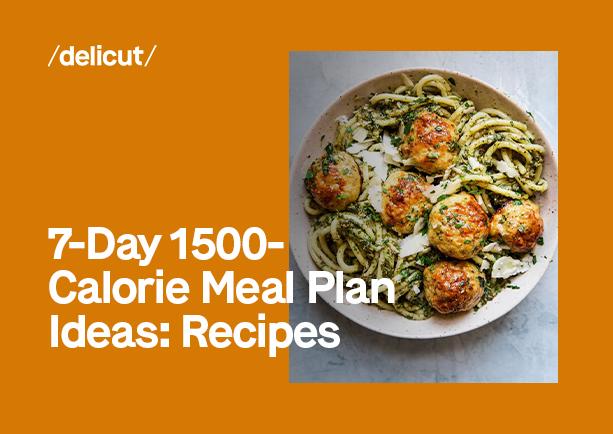7-Day 1500-Calorie Meal Plan Ideas: Recipes

Embarking on a journey towards a healthier lifestyle often begins with mindful eating. A 1500-calorie meal plan is not just about numbers; it's a thoughtful approach to providing your body with the right balance of nutrients for sustained well-being and weight management.
In this blog, we invite you to explore a week of delicious and nutritionally balanced meals designed to fit within a 1500-calorie daily limit. Each day unfolds with a variety of flavors and textures, offering a culinary adventure that proves healthy eating can be both satisfying and enjoyable.
Key Nutrients and Considerations
Embarking on a 1500-calorie meal plan requires a thoughtful approach to ensure you're managing calories and nourishing your body with essential nutrients. Here are key nutrients and considerations to keep in mind:
- Macronutrient Balance:
Prioritize a balance of macronutrients — proteins, fats, and carbohydrates — to support overall health and sustained energy. Include lean proteins, healthy fats, and complex carbohydrates in each meal.
- Micronutrients:
While managing calories, don't compromise on essential vitamins and minerals. Ensure your meals include a variety of colorful vegetables, fruits, and whole grains to provide a spectrum of micronutrients crucial for optimal functioning.
- Protein Adequacy:
Adequate protein intake is essential for muscle maintenance and overall satiety. Include protein sources such as lean meats, tofu, legumes, and dairy to meet your daily protein requirements.
- Fiber-Rich Foods:
Incorporate high-fiber foods like whole grains, legumes, fruits, and vegetables to support digestive health and provide a feeling of fullness, helping to manage calorie intake.
- Hydration:
Staying well-hydrated is crucial. Opt for water, herbal teas, and other low-calorie beverages to support bodily functions and assist in managing hunger.
- Individual Dietary Needs:
Consider individual dietary needs and restrictions. If you have specific dietary requirements or preferences, tailor the meal plan accordingly to ensure it aligns with your goals and lifestyle.
- Variety and Flavor:
Aim for variety in your meals to ensure a diverse range of nutrients and to keep your taste buds engaged. Experiment with different herbs and spices to add flavor without excessive calories.
- Mindful Eating:
Practicing mindful eating involves paying attention to hunger and fullness cues. Eat slowly, savor each bite, and listen to your body to avoid overeating and foster a healthy relationship with food.
Day-wise Meal Plans and Recipes
Day 1: Balanced Start
- Breakfast: Protein-packed smoothie with spinach, banana, and protein powder.
- Lunch: Grilled chicken salad with mixed greens, cherry tomatoes, and vinaigrette.
- Snack: Greek yogurt with berries.
- Dinner: Baked salmon with quinoa and steamed broccoli.
Day 2: Veggie Delight
- Breakfast: Veggie omelet with whole-grain toast.
- Lunch: Lentil soup with a side of mixed greens.
- Snack: Hummus with carrot and cucumber sticks.
- Dinner: Stir-fried tofu with brown rice and assorted vegetables.
Day 3: Plant-Powered Goodness
- Breakfast: Overnight oats with almond milk, chia seeds, and mixed berries.
- Lunch: Quinoa salad with chickpeas, cherry tomatoes, and avocado.
- Snack: Apple slices with a tablespoon of almond butter.
- Dinner: Grilled portobello mushrooms with sweet potato wedges.
Day 4: Mediterranean Bliss
- Breakfast: Whole-grain toast with avocado and poached eggs.
- Lunch: Falafel wrap with tzatziki sauce and a side of Greek salad.
- Snack: Cottage cheese with pineapple chunks.
- Dinner: Baked chicken breast with couscous and roasted vegetables.
Day 5: Asian Fusion
- Breakfast: Smoothie bowl with mixed berries, almond milk, and granola.
- Lunch: Vegetable sushi rolls with edamame.
- Snack: Mixed nuts (almonds, walnuts, and pistachios).
- Dinner: Shrimp stir-fry with broccoli, snow peas, and brown rice.
Day 6: Mexican Fiesta
- Breakfast: Scrambled eggs with black beans and salsa.
- Lunch: Quinoa bowl with black bean chili, corn, and guacamole.
- Snack: Sliced cucumber with salsa.
- Dinner: Grilled chicken fajitas with peppers and onions.
Day 7: Comfort Food
- Breakfast: Banana and blueberry smoothie with a scoop of protein powder.
- Lunch: Tomato and basil whole-grain pasta with a side of mixed greens.
- Snack: Mixed berries with cottage cheese.
- Dinner: Baked cod with sweet potato mash and steamed asparagus.
Conclusion
Beyond the numerical aspect of calories, these recipes are a celebration of nourishing your body with wholesome ingredients and savoring the joy that comes with balanced nutrition. Remember, a meal plan is a guide, not a rigid rule.
Feel free to personalize it to suit your preferences, dietary needs, and lifestyle. The key is to find joy in the process, embracing the delicious diversity of foods that contribute to your overall health and vitality.
FAQs
1. What are the key principles and benefits of following a 7-day 1500-calorie meal plan for those looking to manage their calorie intake?
Principles: Focus on balanced macronutrients, micronutrient variety, and mindful eating.
Benefits: Weight management, improved nutritional awareness, and sustained energy levels.
2. Can you provide a sample 7-day meal plan with recipes that help individuals stick to a 1500-calorie daily limit while maintaining a balanced diet?
-
Breakfast: Protein smoothie.
- Lunch: Grilled chicken salad.
- Snack: Greek yogurt with berries.
- Dinner: Baked salmon with quinoa.
(Continue with similar breakdowns for each day)
3. How can individuals adapt this meal plan to their specific dietary preferences and restrictions, such as vegetarian or gluten-free options?
Swap protein sources (tofu, legumes for vegetarians).
Choose gluten-free grains (quinoa, rice) for gluten-free preferences.
4. Are there any strategies or foods that can help individuals feel full and satisfied while following a 1500-calorie meal plan?
Include fiber-rich foods (fruits, vegetables, whole grains).
Prioritize lean proteins and healthy fats for satiety.
5. What are some guidelines for portion control and meal preparation that can aid in successfully sticking to a 1500-calorie meal plan for a week or longer?
Guidelines for portion control and meal preparation include:
Use measuring tools.
Focus on nutrient-dense, lower-calorie foods.
Trending Searches:
Meal Plan Dubai | Affordable Meal Plans Abu Dhabi | Meal Plan Ajman | Meal Plan Al In | Meal Plan Sharjah | Meal Plan Subscription
Read More:
Superfoods for Super Health Incorporating Nutrient Rich Ingredients Into Your Meals
Lose the Extra Pounds 5 Geat Diet Meals for Your Dinner
7 Day Healthy Vegan Meal Plan Ideas Recipes
The Link Between Diet and Mental Health Foods for a Happy Mind
How to Create a Balanced and Nutritious Plate for Every Meal
Related Blogs
The Burnout Diet
Jan 30, 2026 | 8The mental load of “What should I eat today?"
Jan 22, 2026 | 8The real glow-up starts with your gut health
Jan 14, 2026 | 8Healthy food that doesn’t taste like “Diet Food”
Jan 17, 2026 | 8Why do most people in the UAE get their calories wrong
Dec 8, 2025 | 6DASH Diet Meal Plan
Nov 11, 2025 | 8Fatty Liver Meal Plan
Oct 31, 2025 | 8Pregnancy Diet Meal Plan
Oct 27, 2025 | 82000 Calorie Meal Plan
Oct 1, 2025 | 8Intermittent Fasting Diet Plan
Sep 5, 2025 | 8






